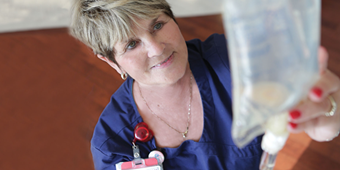For the Men In Your Life: Testicular Cancer Facts

Answer a few questions and we'll provide you with a list of primary care providers that best fit your needs.
Testicular cancer is a relatively rare cancer. It accounts for only 1 percent of all cancers in men. About 1 of every 250 males will develop it in their lifetime.
But urologist Robert M. Kohut, MD, says, “The condition is the most common cancer in American men between the ages of 15 and 35.”
Almost all testicular cancers start in the germ cells of the testicles. These cells produce immature sperm that travel through a network of tubules (tiny tubes) and larger tubes into the epididymis – a coiled tube next to the testicles. The sperm are stored there and mature.
Risk Factors
The following raise the risk for testicular cancer:
- A family or personal history of testicular cancer
- Having had an undescended testicle or abnormal development of the testicles
- HIV infection
- Being white. White men are at four to five times greater risk than African-American and Asian-American men.
Symptoms, Detection, and Diagnosis
When detected early, testicular cancer is nearly 100 percent curable with a lifetime risk of dying of 1 in 5,000. Many doctors and organizations recommend a monthly testicular self-exam for early detection after puberty – especially for men with risk factors.
Dr. Kohut says, “Most patients come in because they feel a lump. It isn't painful, but they notice it’s not going away.”
Signs and symptoms may also include:
- 10 percent of patients feel pain or discomfort in a testicle or in the scrotum
- A change in how the testicle feels
- A dull ache in the lower abdomen or groin
- A sudden build-up of fluid in the scrotum
Physical exam, testicular ultrasound, and blood tests are used to confirm a diagnosis of testicular cancer.
“If there is a suspicion for testicular cancer based on the results of the ultrasound and blood test, the testicle will need to be removed in surgery,” Dr. Kohut says. “A pathologist will examine the cells in the lump to determine the type and stage of the cancer.”
Dr. Kohut adds, “There are two major subgroups of testicular cancer. Seminomas grow and spread slowly and usually occur in men between the ages of 25 and 45. Non-seminomas grow quickly and are more difficult to treat. They appear in men between their late teens and early 30s.”
To determine if the cancer spread to other parts of the body, CT scans of the pelvis, abdomen, and chest are obtained.
Pregnancy tests have been cited in social media as a way to detect testicular cancer, but Dr. Kohut cautions, “That is not good medicine. Pregnancy tests can detect a hormone produced by some testicular cancers, but not all of them. A urine test can miss many forms of testicular cancer.”
When detected early, testicular cancer is nearly 100 percent curable.
Testicular Cancer Treatment
“Once we know the type and stage of testicular cancer,” Dr. Kohut explains, “we’ll either watch it or provide more treatments. In many cases, removing the testicle ( radical inguinal orchiectomy) is all the treatment that is needed. In some cases, patients may need chemotherapy, radiation therapy, and surgery to remove lymph nodes ( retroperitoneal lymph node dissection) in the abdomen.”
Chance Of Cure
Testicular cancer can usually be cured in patients who receive chemotherapy or radiation therapy after surgery. And it is nearly 100 percent curable when found early.
The following factors affect the treatment used and chance of recovery:
- Type of cancer
- Size of the tumor
- Stage of the cancer
- Number and size of affected lymph nodes, if the cancer has spread
Can Testicular Cancer Cause Infertility?
Dr. Kohut says that some testicular cancer treatments may cause a low sperm count. And some tumors produce a substance that may temporarily interfere with fertility.
“Many men use sperm banking before treatment as a way to preserve healthy sperm for future family planning,” he adds. In sperm banking, sperm is frozen and stored for later use.
In many cases, when only one testicle is involved, infertility is temporary. But in some cases, infertility may be permanent.
Answer a few questions and we'll provide you with a list of primary care providers that best fit your needs.
Source: Robert M. Kohut, MD, Premier Health Urology; American Cancer Society; National Cancer Institute




